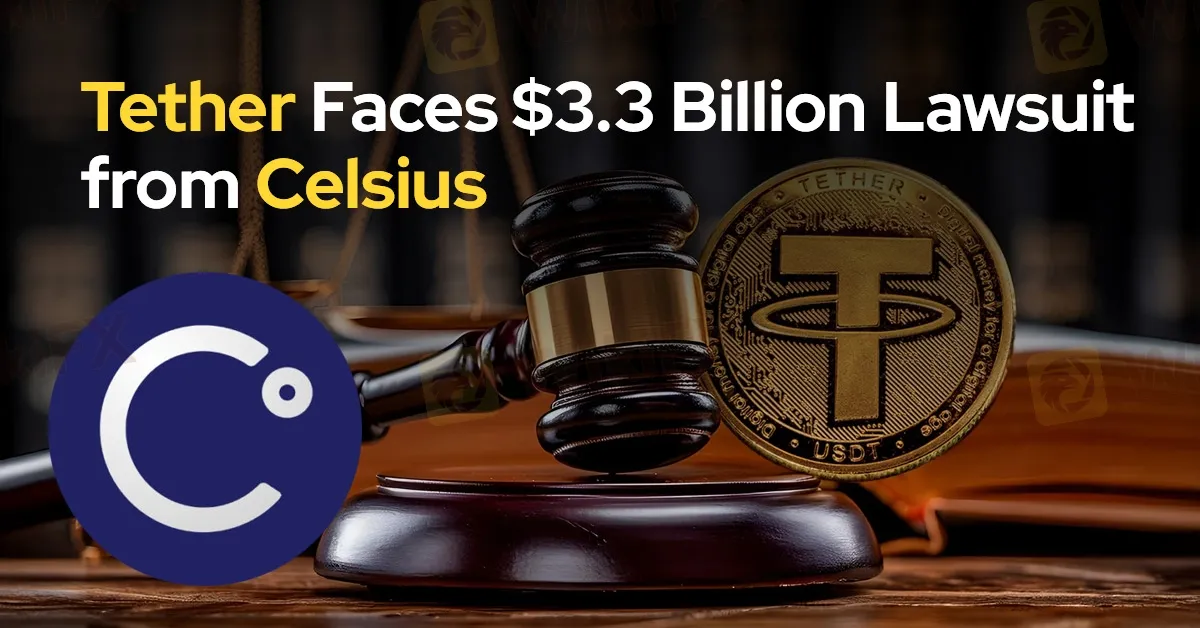简体中文
繁體中文
English
Pусский
日本語
ภาษาไทย
Tiếng Việt
Bahasa Indonesia
Español
हिन्दी
Filippiiniläinen
Français
Deutsch
Português
Türkçe
한국어
العربية
Tether Faces $3.3 Billion Lawsuit from Celsius
Abstract:Tether is vigorously contesting a $3.3 billion lawsuit from the bankrupt lender Celsius, which accuses it of fraudulent Bitcoin transfers, while Tether maintains the claims are baseless and asserts its financial stability remains intact.

Tether, the company behind the leading stablecoin USDT, is gearing up to challenge what it labels as a “shake-down” lawsuit from the defunct cryptocurrency lender Celsius.
The lawsuit, lodged with the U.S. Bankruptcy Court for the Southern District of New York, demands that Tether either return 57,428.64 Bitcoin (BTC) or pay its equivalent, which is around $3.3 billion based on current valuations. Celsius alleges that Tether engaged in “preferential and fraudulent transfers” of Bitcoin during the market downturn in mid-2022, just prior to Celsius bankruptcy filing. According to the lawsuit, Tether demanded and received additional collateral from Celsius to secure its position, a move Celsius argues was intended to protect Tether from the looming bankruptcy.
Tether counters these claims, asserting that the Bitcoin was sold at Celsius‘ instruction and with its consent at June 2022 prices. Tether’s CEO, Paolo Ardoino, took to X to label the lawsuit as meritless and affirmed that Tethers actions were fully compliant with their agreement. He vowed to defend against the lawsuit “vigorously” to set a precedent against what he deems “unprincipled money grabs.”

In addition, Celsius is seeking $100 million in damages, accusing Tether of applying Celsius‘ Bitcoin collateral at an undervalued rate, which they claim should be recovered for the benefit of Celsius’ estate. Tether, however, maintains that it remains in a strong financial position, with consolidated equity of nearly $12 billion as of June 30. The company reassures that Tether token holders will not be affected by the ongoing lawsuit.
Previously, Tether dismissed rumours that it had received a $2 billion loan from Celsius. Paolo Ardoino responded to a report by the Celsius examiner that alleged USDT had borrowed from Celsius, along with Three Arrows Capital and Alameda Research. The examiner‘s report, authored by former prosecutor Shoba Pillay, highlighted that Celsius had credit limits for its borrowers, but entities like Alameda, Tether, and 3AC exceeded these limits. It noted that Celsius’ exposure to Tether had surpassed $2 billion and was considered an “existential threat” internally at Celsius. Ardoino suggested that the report might have contained a typographical error or misinterpretation, possibly meaning “Celsius loans from Tether” rather than “Celsius loans to Tether.”
Tether clarified that the loan from Celsius has been fully repaid without any loss. The company emphasized that its lending to Celsius was always overcollateralized, as is standard practice, and had no impact on Tethers reserves. The decision to liquidate the collateral to cover the loan was in line with the original terms agreed upon, which Tether confirmed in writing with Celsius before the liquidation process began. While Tether did have a small investment in Celsius, the company stated that this investment is a minor part of its shareholder equity and has no effect on USDT reserves.

Disclaimer:
The views in this article only represent the author's personal views, and do not constitute investment advice on this platform. This platform does not guarantee the accuracy, completeness and timeliness of the information in the article, and will not be liable for any loss caused by the use of or reliance on the information in the article.
Read more

RM62k Lost Investment Scam After Joining XRP Community Malaysia on Telegram
A 30-year-old homestay manager from Chendering, Malaysia, fell victim to an online bitcoin investment scam, losing RM62,214.59. According to Kuala Terengganu police chief ACP Azli Mohd Noor, the incident unfolded after the victim joined a Telegram group named “XRP Community Malaysia” on December 19. The group promoted bitcoin investments allegedly powered by Artificial Intelligence (AI).

Russia Turns to Bitcoin for International Trade Amid Sanctions
Russian companies are increasingly using Bitcoin and other cryptocurrencies to bypass Western sanctions and facilitate international trade. The country's Finance Minister, Anton Siluanov, confirmed that cryptocurrencies mined in Russia are now being employed for foreign transactions under an experimental framework.

Hong Kong Stablecoins Bill Boosts Crypto Investments
Hong Kong's Stablecoins Bill sets regulatory standards for crypto issuers and platforms, aiming to protect investors and strengthen the city's crypto investment appeal.

Malaysia Pioneers Zakat Payments with Cryptocurrencies
Malaysia has taken a significant step in modernising religious practices by becoming the first country to enable zakat payments through digital assets.
WikiFX Broker
Latest News
Why is there so much exposure against PrimeX Capital?
Russia to Fully Ban Crypto Mining in 10 Regions Starting January 1, 2025
Two Californians Indicted for $22 Million Crypto and NFT Fraud
Macro Markets: Is It Worth Your Investment?
WikiFX Review: Is Ultima Markets Legit?
Colorado Duo Accused of $8M Investment Fraud Scheme
What Impact Does Japan’s Positive Output Gap Have on the Yen?
RM62k Lost Investment Scam After Joining XRP Community Malaysia on Telegram
Victims of Financial Fraud in France Suffer Annual Losses of at Least €500 Million
SEC Warns on Advance Fee Loan Scams in the Philippines
Currency Calculator


